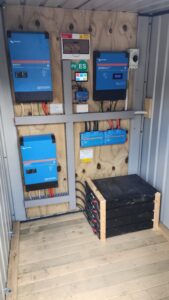Is it worth going off-grid?
Ever considered embracing complete energy freedom and going off-grid? It’s a dream many share and one that’s both exciting and challenging to achieve.
With an off-grid setup, your solar panels soak up sunlight, converting it into electricity. This power is used in the home, or stored in batteries ready for use during the night or grey days. Essentially, it’s your personal power station, detached from the main grid. You’ll also need a backup generator for times when your system is not able to generate enough energy.
What does going off-grid involve?

Success in going off-grid comes down to sizing your system right, including having enough battery storage. If you want to go off-grid, start by assessing your energy requirements. Complete a load sheet to determine the usage and duration of your appliances.
Remember, going off-grid can be costly, especially with a large energy load. Reducing energy consumption, using efficient appliances, or eliminating unnecessary loads can significantly reduce the system size you need. For example, a spa pool or underfloor heating will require a very large system if you’re off-grid.
Once you’ve worked out your load profile, and considered any reductions, we can calculate the appropriate number of solar panels and the battery capacity required, ensuring your needs are met even during periods with little or no sunlight.
Getting your off-grid solar system right from the start will save you any pain later on. Your system will be your one source of energy, so investing in good-quality components is well worth it.
Weighing the Pros and Cons of Off-Grid Systems:
The Pros:
- Complete energy independence
- Resilience in natural disasters
- Allows power in places unreachable by the grid
The Cons:
- More expensive than grid-tied options
- Oversized for most of the year, with no way to export excess energy
- Load reduction is usually needed (You have to be careful of what uses power in your home)
When we recommend it:
– Remote locations where the grid connection is impractical or too expensive.
– New developments without grid access.
An Alternative: Hybrid System
If your property is already connected to the grid, consider a hybrid system.
A hybrid system is a mix between a grid-tied and an off-grid system. It consists of, solar panels, a solar inverter and a battery.
This allows you to live off-grid but with grid backup when needed.
A major difference from a fully off-grid system is the battery size. An off-grid system will generally have the battery sized to get through a few days of inclement weather, whereas a hybrid system will usually be sized to store enough energy to get through the night until the sun comes out the next day.
Another benefit of a hybrid system is that it also allows you to sell excess solar back to the grid.
Interested in learning more about off-grid or hybrid systems? Contact us to discuss your options.